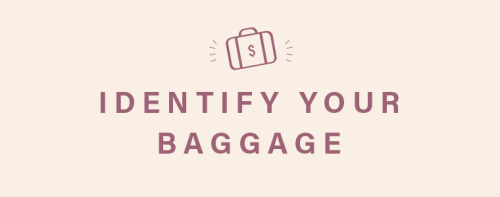How to let go of your financial baggage in order to set a budget that *works*
Financial expert Farnoosh Torabi explains how your emotions can cloud your financial judgment.

Last week, you took a good, hard look at your spending habits. Now, it’s time to dig a little deeper. *Why*do you tend to splurge when you’re stressed, or pinch pennies, or treat your friends to dinners (and fitness classes) you can barely afford? Chase Slate Financial Education Ambassador Farnoosh Torabi reveals why your purse strings are so often tangled with your heart strings—and provides a game plan for setting things straight.

On paper, that budget you just put together looks pretty straightforward. It should be pretty easy to follow, right? Turns out, it is—for a week or two. But then you have a bad review at work, or get in a screaming match with your partner, and the next thing you know, you’re handing over your credit card for that pair of designer boots you’ve had your eye on for months, thinking, “I deserve this.” Or, “This will cheer me up.”
For most of us, money represents so much more than just a number in a bank account, and how you interact with it depends on how you were raised, what your current relationships look like, and what kinds of challenges you’ve recently faced.
You can’t ever take emotion out of the financial equation completely, but the key is being able to identify when your emotions are beginning to cloud your judgment. Successful budgeting requires regular check-ins—not just with your bank statements, but with yourself.
Keep reading for your 3-step plan to keeping your emotions in check in order to stay in control of your financial situation.

1. Identify your baggage
First off, think about what financial security means to you. Does your version of being financially secure mean your needs and some wants are being met and you have a safety net in place should something go wrong? Or when you picture financial security, does it look more like you wandered onto the set of Real Housewives of Beverly Hills? If it’s the latter, it’s time to dig a little deeper.
Why is it that you equate lots of lavish stuff with financial freedom? Did you grow up in a family that struggled to make ends meet? Are you dealing with the aftermath of a major life change, like a divorce or a foreclosure? Once you identify the root of your money insecurity, you can more objectively see when and how you’re getting in your own way.

2. Take a time out
Before you pull the trigger on any purchase that isn’t an obvious “need”—i.e., related to housing, or food, or debt repayment—get into the habit of making yourself wait a day. Use that time to reflect on what the item in your cart represents, and how that item fits into the bigger picture. Will straying from your budget for the sake of that pair of shoes get you closer to, or farther from, your goals? By giving yourself some distance from whatever it is you wanted in the moment, you’ll be able to think about it with a cooler head.

3. Talk to a pro
Sometimes our attitudes around money are so ingrained, we need a little extra help extricating ourselves from the hard-to-break cycle of spending, feeling bad about it, and spending more. If you’re really struggling to take control, it may be time to talk to a therapist. He or she can help you get to the root of your bad money habits and identify where your insecurity around money is really coming from.
There are actually a growing number of financial therapists who specialize in the psychology of money; some are psychologists or social workers who later chose to educate themselves on financial planning, while others are traditional financial planners who chose to branch out and study psychology or counseling. In either case, they’ll be able to help you work through the emotions behind your spending—and make a (realistic) plan that takes your weaknesses into account.
If you’re concerned about the cost of a therapist, there are plenty of free resources available. Debtors Anonymous, an organization with a method modeled after Alcoholics Anonymous’s 12-step program, is dedicated to helping its members break the habits that lead to the accumulation of debt. DA hosts meet-ups around the country. Similarly, there are Facebook communities for people who are looking to get out of debt—you can search under the Groups tab in order to find the one that speaks to you—who cheer each other on, and support one another when times are tough. Either way, connecting with a group of people facing similar circumstances can make the process of getting in control a lot less lonely.
Farnoosh Torabi is one of America’s leading personal finance authorities. From her early days reporting for Money magazine to hosting a primetime series on CNBC to becoming a Chase Slate Financial Education Ambassador, she’s become a go-to money expert. Millions of Americans tune into Farnoosh’s award winning podcast, So Money, and her work and advice have been featured in The New York Times, The Wall Street Journal, O, The Oprah Magazine, Fortune, Forbes and Time. For more, check out www.Farnoosh.TV.
While your emotions can cloud your financial judgment, your judgment can prevent you from achieving your goals. And here’s your tool kit for getting into a groove with your new meal plan, exercise regimen, meditation practice, and more.
Sign Up for Our Daily Newsletter
Get all the latest in wellness, trends, food, fitness, beauty, and more delivered right to your inbox.
Got it, you've been added to our email list.








